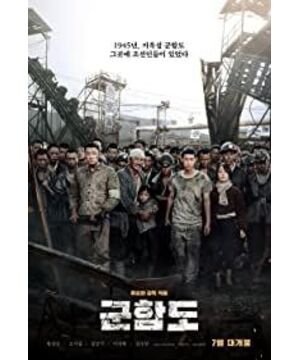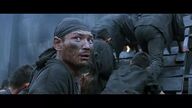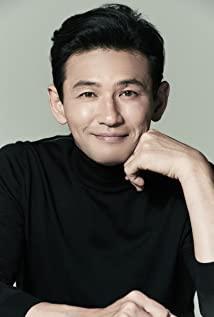The first time I learned about Hashima was in the variety show Infinite Challenge. It was the anniversary of World War II. Kim Tae Ho PD taught the general public a very profound history lesson on the grounds of delivering food. So when I saw the title of the film and its content was introduced, I had the desire to watch it.
Back to the movie itself, when I was lying in bed at home and watching it, I realized how powerful the cast of this movie is. Although it didn't take long for Han Ying to enter the pit, the characters who appeared were all famous, Huang Zhengmin, Su Zhixie, Song Zhongji, Li Jingrong, and even the actors who played the little girl, although I can't name them, but their faces are familiar. I checked them later and found out that they had participated in Train to Busan and Walking with God. The three protagonists perform their own duties and have different personalities. The father played by Huang Zhengmin is flattering and flattering in order to survive; the gang boss played by Su Zhixie cannot bear to be bullied and snatch the management rights of the Koreans; Song Zhongji shoulders the spiritual leader of saving the Koreans. A character who ripped off his true face. These three lines dominate the whole story, interspersed in the middle are the feelings of Huang Zhengmin's father and daughter, and the feelings of So Ji-sub and the woman, until the last three lines combine to form the entire climax of the story.
It's hard to say what a great movie it is, but the meaning is very important. He at least reminds us of that unforgettable history, those forgotten refugees. The reason why I say he is not a great movie is that I think the expressions of Korean movies are always so inciting and dramatizing the expression of history. Of course, it is undeniable that this expression increases the viewing value, but weakens it. The expression of history, the overly emotional candle-raising scene at the end of the film, and even the confrontation scene of the last battle, are all very cinematic expressions. Of course, the movie needs a climax, and that battle did achieve his effect, but it made me play very much. After the film, I checked the real historical events, and no one ever escaped from the warship island, let alone a whole ship. When it comes to the last scene of the atomic bomb explosion, the director seems to want to leave blank, but I think it is too much.
There are several scenes that are unforgettable to this day. The first one is the father and daughter dancing under the street lights. This short tens of seconds of scenes not only neatly explained the deep feelings of the father and daughter, but also showed how they lived in such a harsh external environment. The pursuit of art and the optimistic attitude of the next father and daughter have paved the way for the later turning point. The other is the comfort women's remarks to Su Zhixie. In fact, at the beginning, the two of them had already met on the boat, but through the remarks at the head of the bed, one leaned against the wall to talk about the past very calmly, while the other sat at the table with no expression. Before drinking alone, Su Zhixie did not advocate violence. He was also a very gentle person at heart. He could even sacrifice himself for the sake of righteousness. The tragic female character in the play has experienced hardships again and again, and these hardships were actually caused by his own clan for.
The film does not blindly criticize Japan, but instead allows the audience to see the inferiority, hypocrisy, betrayal, ugliness, cowardice, ignorance, and cannibalism of the Korean nation itself. These words are not seen from the Japanese, but from the people of their own nation. See. The spiritual leader who seems to be a great man secretly colluded with the Japanese to deduct the wages of the workers, while as a member of the same ethnic group, he did the evil deeds of oppressing the people of his own nation, and when everyone finally wanted to escape from this hell, there were still people who helped Japan speak. , This film shows the backwardness and ignorance of this Korean society at that time. As mentioned above, although the expression of the film is not great, the Korean people's understanding of themselves can be said to be very great. Sometimes it is not so easy to face the history of their own nation, especially the history of suffering. It can be said that China has It is difficult to make such a profound commercial film. At most, it can only be seen in a few works of director Jiang Wen, and it is almost difficult to see it in mainstream commercial films. This is exactly what can be praised in such a movie that seems to be an anti-Japanese blockbuster, and it is also one of the reasons why I recommend it.
View more about The Battleship Island reviews











